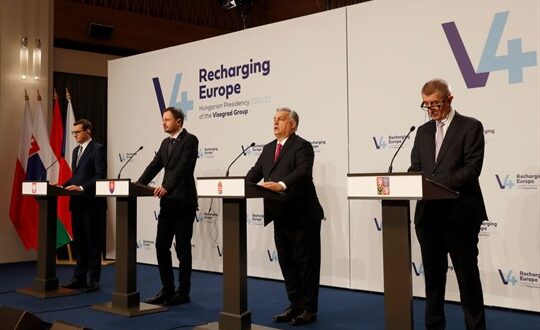Germany’s new coalition government began winning glowing reviews even before it took office in early December. Its coalition agreement, released in November, satisfied many observers on a range of policy areas, both domestic and international. But one European leader wasn’t impressed.
“The gloves are off!” Hungarian Prime Minister Viktor Orban declared as Olaf Scholz took over as Germany’s new chancellor.
Orban has spent the past decade or so stirring up a series of confrontations with his European Union counterparts, as well as the European Commission in Brussels, over rule of law issues and judicial independence. He did so confident that, when push came to shove, Scholz’s predecessor, long-time former Chancellor Angela Merkel, would shield him from any potential consequences.
Until recently, European Parliament members from Orban’s ruling Fidezs party were members of the conservative bloc that includes Merkel’s Christian Democratic Union, making him a useful, if problematic, “frenemy.”
However, with the coalition of Scholz’s Social Democratic Party, the Greens and the pro-market Free Democratic Party now in government, Berlin’s approach to Hungary’s rule of law infringements looks set to shift. And that could have a significant impact on the Visegrad Four regional bloc comprising Hungary, Poland, the Czech Republic and Slovakia.
Alongside Poland’s nationalist, conservative government under the Law & Justice party, or PiS, Orban has in recent years sought to turn the V4, as the bloc is known, into a populist force able to challenge Brussels’ emphasis on democratic values. But while Warsaw often marches in lockstep with Orban, Prague and Bratislava remain ambivalent, keen to cooperate with their neighbors but wary of being tarred with the same troublemaker brush.
They’re likely to seek to distance themselves further should Germany, the region’s uncontested political and economic power, take a more forceful stance on Hungary and Poland’s persistent battles with Brussels, as expected.
“Merkel moved between cooperation and silence when it came to the V4,” says Ziga Faktor, who heads the Brussels office of the Czech think tank Europeum. “The new German government will help to split the group.”
Originally established in 1991 as a vehicle to help steer the four countries toward EU membership, the V4 has been hijacked by Orban and weaponized to undermine Brussels, suggest some observers in Bratislava and Prague.
It’s a strategy that has worked to some extent. All four V4 members baulked at the EU’s mandatory quotas for taking in migrants from frontline states at the height of the 2015 refugee crisis, and they have collectively pushed to have nuclear power included in Brussels’ “taxonomy” of green energy sources.
However, Czechia and Slovakia are selective in the battles they join with their V4 partners. Even under former populist Prime Minister Andrej Babis, Prague’s approach to the V4 was to cooperate on shared priorities while ignoring topics of disagreement.
“The V4 has essentially been the V2+2 for some years already,” says Daniel Hegedus, a Hungarian analyst at the German Marshall Fund of the United States.
The new German government is likely to encourage that split as it steps up the fight against illiberalism.
“German foreign policy is … likely to emphasise human rights and democratic values more in its foreign relations from now on,” suggests Christian Schweiger at Technische Universitat Chemnitz. Annalena Baerbock, the new foreign minister in Scholz’s government, “is most likely to take an uncompromising stance towards the ‘democratic backsliders.’”
And with the EU now beginning to dole out pandemic recovery funds from its historic 2020 collective debt agreement, Berlin can now use its leverage in Brussels to hit Hungary and Poland where it hurts: in the wallet.
Scholz and the new government in Berlin are not the only factors widening the Visegrad Four grouping’s internal divide. “The coalition agreement calls for very clear support for the EU’s rule of law conditionality mechanism for distributing funding,” Hegedus notes, referring to a clause in the collective debt agreement that made disbursements of relief funds dependent on member states respecting EU norms on rule of law.
While the EU has sought to raise the ante in recent months, more full-throated support from Berlin will tighten the screws on Budapest and Warsaw. Berlin’s political clout stems from its economic might, and nowhere is this more obvious than among the V4 countries.
“Germany is the biggest trading partner by far for the V4, so they all need to maintain good relations with Berlin,” says Faktor.
For its part, Scholz’s government was swift to try to build bridges. Both the new chancellor and Baerbock visited Warsaw within days of taking office.
“It was a gesture to Poland that it’s an important strategic partner,” says Hegedus.
However, their hosts appeared more interested in scoring points with a domestic audience than in nuanced diplomacy. During the visits, Polish officials called for Nazi-era war reparations and criticized Berlin’s role in the construction of the Nord Stream 2 gas pipeline that, when operational, will deliver Russian gas directly to Germany, bypassing Ukraine.
Both Scholz and Baerbock listened politely, as Merkel always did under similar circumstances, and it’s widely believed that Germany will continue to approach bilateral relations with such calm. But inside the EU institutions, Berlin will now leverage its immense weight to join the fight against illiberalism.
The new German government has suggested it will encourage the European Commission “to confront member states that have violated rule-of-law norms and obligations,” pointed out Aaron Allen, a nonresident fellow at the Center for European Policy Analysis, in a recent WPR briefing.
“This of course risks deepening existing divisions between the EU core, dominated by Germany, and the Central-Eastern periphery even further,” said Schweiger.
Budapest and Warsaw are clearly rattled. “We understood [Merkel], she understood us,” Orban stated. “We now prepare for battle with our eyes wide open.”
The Hungarian prime minister has good reason to resort to such inflammatory rhetoric ahead of elections in the spring. However, the strength of the reaction in Budapest suggests genuine concern.
As Scholz was inaugurated, Hungary’s pro-government media warned that Germany would now seek to encroach on Hungarian national sovereignty and impose Brussels’ purportedly pro-LGBTQ and pro-Islamic ideology.
Some officials drew comparisons to Nazi Germany’s occupation of Hungary in 1944. “The new German government wants to change not only their country, but also Europe. They want to create a new empire,” Secretary of State for Defense Szilard Nemeth said.
The reaction was similarly hysterical in Poland, where PiS party leader Jaroslaw Kaczynski warned of Berlin’s ambition to establish a “Fourth Reich.”
However, while such rhetoric resonates in Hungary and Poland, it doesn’t tend to travel well across the V4. “Czechia and Slovakia don’t allow Hungary to proscribe relations with Germany,” says Hegedus.
Scholz and the new government in Berlin are not the only factors widening this internal divide. The new Czech government, which took office on Dec. 17, is also likely to be something of a game changer for Central European political alliances.
In contrast to former Prime Minister Babis’ occasional illiberal urges, the new government insists that it will reaffirm the country’s commitment to the rule of law.
“Czechia has occupied the middle ground in the V4 between Slovakia on one side and Hungary and Poland on the other in recent years,” says Faktor. “But with the new governments in Berlin and Prague, the group will split further.”
As if to illustrate the point, Prague’s response to Scholz’s inauguration was very different than that of its Visegrad partners in Budapest and Prague. “Germany is our biggest trading partner and its success will be, to a large extent, ours as well,” remarked Marketa Pekarova Adamova, Czechia’s new parliament speaker.
The five-party coalition government in Prague looks set to maintain a pragmatically ambivalent approach to the V4. After all, Prime Minister Petr Fiala’s ODS party includes Euro-skeptic factions that are sympathetic to Budapest and Warsaw.
However, the other parties in the coalition are highly wary of their illiberal neighbors’ confrontations with Brussels, and senior Czech officials have openly expressed concern.
“I do not think that the V4 is useless or should be weakened,” said Mikulas Bek, the new government’s minister for EU affairs. “However, we should establish the same intense relations with other EU member states.”
Prague’s relations with Warsaw have already been disrupted by Poland’s refusal to abide by a ruling by the EU’s top court to shut down the Turow lignite mine near the two countries’ border. Warsaw is defying the same court in a dispute over judicial independence, and the new Czech government says it will side with Brussels in that fight also.
“Our position in their dispute over the rule of law with the European Union will definitely be different from theirs,” Bek added.
New Foreign Minister Jan Lipavsky has expressed similar sentiments, insisting that EU law “unequivocally” trumps national law, a core EU norm that a Polish tribunal recently challenged.
All this said, Czech foreign policy is famously cautious, and Fiala is unlikely to allow his ministers to intentionally rock the boat with Prague’s V4 partners.
But should Berlin push the EU into action—via a vote on Article 7, Brussels’ “nuclear option” that suspends a member state’s voting rights, for instance—Prague and Bratislava may be forced to choose sides.
 Eurasia Press & News
Eurasia Press & News




